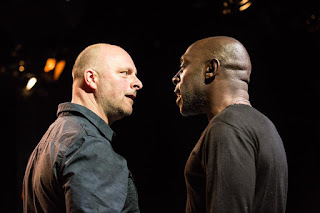Two more points of view on the story of Euripides' Iphigenia at Aulis at the
Gate as part of The Iphigenia Quartet; you can read my review of
Iphigenia and Chorus here, but tonight Caroline Bird gets arguably the
toughest job, of trying to see things from the perspective of Agamemnon.
Although it's his brother whose wife has been abducted, Agamemnon (Andrew French) is
leading the Greek charge to get her back, and is therefore the man in the spotlight.
Bird focuses on him not as a bloodthirsty villain but as a rather weak man buffeted
by circumstance and unable or unwilling to stand up to it. As the play begins he's
consented to the sacrifice of his daughter but changed his mind, sending a letter to
his wife telling her to stay away. It's too late, of course, and besides the
Messenger (Louise McMenemy) is brutally pragmatic about the Greek cause and makes
sure the letter doesn't reach Clytemnestra.
Instead she gives it to the man who emerges as the real villain of the piece,
Agamemnon's sociopathically distant and callous older brother Menelaus (Nigel
Barrett.)
Cécile Trémolières' set for The Iphigenia Quartet is a large sacrificial slab
in the centre of the traverse; while none of the four plays actually shows the
death, the grate at its centre, waiting to collect sacrificial blood, is an ominous
centrepiece. But there's also a recurring motif of stags' heads, reminiscent of both
the sacred stag Agamemnon killed to incur Artemis' wrath in the first place, and the
deer that (possibly, depending on who you believe,) replaced Iphigenia as sacrifice
at the last minute. Director Christopher Haydon expands on this idea, with the
brothers not only having the design tattooed on their necks, but almost literally
locking horns when they fight over Iphigenia's fate.
Like the other double bill, this one starts with the - comparatively - traditional
narrative, and it's a strong retelling although I'm not sure describing the way
Agamemnon won Clytemnestra in marriage - by murdering her first husband and son -
fits with the man as we see him. In any case, the show is stolen by Sharon
Duncan-Brewster's Clytemnestra - a force of nature whether it's in glee when she
still believes the story about her daughter's royal wedding, or in fury when she
discovers the truth.
The queen is the focus of the final piece but neither she nor any of the other major
players actually appears: Lula Raczka writes and Jennifer Tang directs
Clytemnestra, told at one remove both within the story and outside it: A
movie Director (Anthony Barclay) pitches a film adaptation, the first of what he
hopes will be a franchise following Clytemnestra's turn to murder; while a Professor
(Susie Trayling) lectures on Euripides' play. Both come back not to any of her
speeches but to the moment when she remains silently on stage, by a door on the
other side of which her daughter is being sacrificed. Dwane Walcott is a Soldier who
was with her at the time, and perhaps unwisely tried to help her. And then Shannon
Tarbet's Maid works at the palace during the war and its aftermath; to her there's
something obscene about the story of Iphigenia being replaced with an animal
sacrifice, the child of royalty being spared by the gods who showed no such mercy to
soldiers like the Maid's brother.
It's essentially a deconstruction of Iphigenia at Aulis, the most open-ended
of the four plays, not entirely satisfying as a result but fascinating in the
questions it asks nonetheless. On balance I would pick Iphigenia /Chorus as the stronger of the two double bills, but the whole project is one
I've found very interesting, with four writers taking the same story - including
quite a lot of specific details which occur throughout - and being led to very
different places by it. It's interesting how they sometimes end up in the same
places as well though: The aforementioned "happy ending," where Artemis saves
Iphigenia at the last minute, is seen by more than one writer as a betrayal of the
regular soldiers, of Greek families having to send their sons and daughters to die
while their leaders are let off making a similar sacrifice.
The Gate also continues to be one of the few places reliably delivering succinct
theatre - even with two plays per night they've resisted adding an interval, meaning
that while flabby running times are a theme everywhere else this year, they continue to buck the
trend and deliver a wealth of ideas without an indulgent running time.
The Iphigenia Quartet - Agamemnon by Caroline Bird and Clytemnestra by
Lula Raczka, based on Iphigenia at Aulis by Euripides, is booking in
repertory until the 21st of May at the Gate Theatre.
Running time: 1 hour 20 minutes straight through.
Photo credit: Helen Murray.






No comments:
Post a Comment